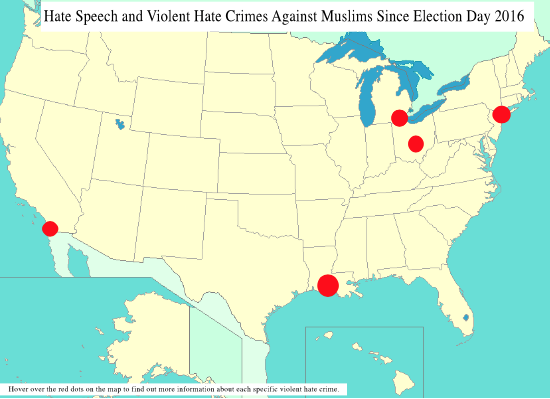By Randall Waszynski & Christopher Cameron
On the day after the presidential election, Sanaa Nadim served as chaplain for the largest congregation of Muslim students she’d seen at Stony Brook University that semester. What was scheduled as a weekly general body meeting for the Muslim Student Association became an outlet for Muslim student’s fear of what was to come.
Their concerns were shared with hundreds of thousands of Muslims across the nation, as over 437 cases of hateful harassment and intimidation were reported targeting many minority groups, including Muslims, in the week since the election, according to the Southern Poverty Law Center.
“There’s been a lot of backlash around the city, there’s been vandalisms of mosques,” Nadim said. “But on campus, we’ve been very lucky, thank God.”
In a region where Donald Trump won his largest plurality in New York state during the presidential election, Long Island’s Muslim residents have reported no incidents of hate crime in the week since the election.
Fifty-two percent of Suffolk County and 45 percent of Nassau County voted for Donald Trump in the general election. Trump has suggested deporting or banning Muslims from entering the country, along with repeated condemnations of Muslim Americans, during his campaign.
The FBI released a report this week showing a 67 percent increase in hate crimes against American Muslims in 2015. But the surge in incidents of hate-crimes against Muslims has correlated more with population density than areas with high voter support for Donald Trump, according to a map plotted by Muslim Advocates. Long Island in particular has had no incidents reported since recording started in November 2015.
“For example, there are hate crimes taking place in California even though people there tend to be more liberal and open to diversity,” Madihha Ahussain, staff attorney for the civil rights group Muslim Advocates, said. “My general sense is that people feel emboldened to carry out these feelings.”
Many Muslims on Long Island have also expressed sympathy for the economic incentives to vote for Trump. While many Republicans didn’t like Trump, his business acumen appealed to many voters who had concerns about the economy, Shamim Quraishi, a worshipper at the masjid run by the Islamic Association of Long Island in Seldin, said.
“They want to win. They wanted to select somebody, but not Trump,” Quraishi said. “But he will get to know people. He will meet people. They will advise him ‘you have to change as a president; you can’t just say whatever you want.’ ”
The insularity of the Muslim community could be contributing to the widening rift between Muslims and the rest of America, Rehat Mannan, the president of the Muslim Students Association at Stony Brook, said.
“We don’t take it on our own selves to go out and do something new,” Mannan said. “It’s our fault because we don’t diversify. We tend to click to one another instead of communicating with other community members.”
With tensions reaching the breaking point on the national level, members of the Muslim community on Long Island say they have faith in the institutions of the American government.
Ultimately, campaign promises take a back seat to the responsibilities of the presidency, Amin Rahman, the director of the Islamic Association of Long Island, said.
“In every community, in every society, in every country, probably in every faith, there are some people who just go to the extreme limit. They’re everywhere,” Rahman said. “So things are happening, but the only thing we can do is just report it to the concerned authorities. So anyone who does something wrong will have to face justice.”
